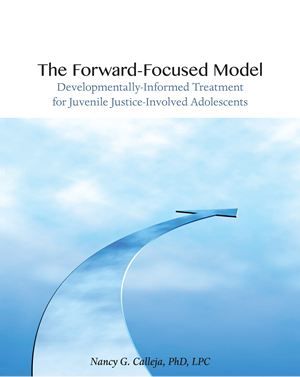





Leading the Way in Evidence-Based Practice
The recently published findings on the Forward-Focused Model© of treatment for juvenile justice-involved adolescents marks the second evidence-based practice developed by Spectrum’s Clinical Director and implemented at Spectrum. The Second Chance Juvenile Reentry Program was the first—recognized by the National Institute of Justice as a promising practice.
In addition to these originally developed evidence-based practices, Spectrum has conducted several action research studies to evaluate Trauma-Focused Cognitive Behavioral Therapy with specific populations and without specific components. As a result, efficacy has begun being established for the use of the treatment with justice-involved adolescents and without the caregiver component.
Spectrum Continues its Mission as a Knowledge-Based Organization:
Just Announced: Assessing and Addressing Critical Co-Occurring Mental Health Needs of Detained Adolescent Males Continuing to expand Spectrum’s commitment to high impact action research with the most vulnerable adolescents, Spectrum will be implementing a pilot project to provide targeted treatment to justice-involved adolescents in residential treatment. Up to 150 youth will be assessed and treated for co-occurring trauma, depression and substance use symptoms using evidence-based practices. The two-year project, funded in part by the Ethel and James Flinn Foundation, allows Spectrum to further enhance the services and treatment they currently provide to adolescents in residential treatment. In addition, it allows Spectrum to learn more about the effects of this innovative assessment-driven approach to addressing this current complex problem through rigorous evaluation. The project will be implemented from January, 2026 through 2027.
Other Major Projects:
Addressing the Complex Needs of Vulnerable Adults through the Delivery of Evidence-Based Treatment and Integrated Health Screening and Care Coordination
Expanding Spectrum’s commitment to action research, Spectrum implemented its first integrated health screening, care coordination and treatment program. More than 300 adults in Wayne county participated in primary health screening and medical care coordination services and screening and treatment of trauma-related symptoms and substance use. The two-year project, funded in part by the Ethel and James Flinn Foundation, included an evaluation, allowing Spectrum to learn more about the effects of integrated care models on vulnerable populations.
Implementing Evidence-Based Practices in Juvenile Justice
The Forward-Focused Model© has been implemented in Spectrum’s secure residential treatment programs since 2015 following implementation throughout other state and regional systems. The published findings of the model’s evaluation indicate an almost twofold reduction in recidivism three years post-release (Calleja, 2021). The cutting edge treatment model, based on the most recent research and best practices in juvenile justice, addresses the complex needs of adolescents, including trauma, co-occurring issues, brain development and other developmental needs.
Addressing Trauma Among System-Involved Adolescents
Continuing Spectrum’s commitment to evidence-based treatment and addressing trauma among the most vulnerable individuals, Trauma-Focused Cognitive Behavioral Therapy is being provided to child welfare-involved and juvenile justice-involved adolescents. Approximately 100 adolescents will be able to participate in the specialized treatment, and the knowledge gleaned from the results will be used to inform future trauma treatment approaches. The project will continue through 2022.
This marks Spectrum’s fourth major treatment delivery and outcomes evaluation project focused specifically on evidence-based trauma treatment for children and adolescents.
Implementing a Company-Wide Trauma-Focused Environment
Spectrum Child and Family Services recently completed designing and implementing a trauma-focused environment throughout all of its programs. The year-long project involved the participation all employees and resulted in a transformed service delivery, better equipped to most effectively address the needs of individuals served. Additional funding support for the project was provided by the Ethel and James Flinn Foundation.
Reentry Program Nationally Recognized as a Promising Practice
The Wayne County Second Chance Reentry Project, a county-wide collaborative effort led by Spectrum Human Services, Inc. and Central Care Management Organization, has been nationally recognized as a promising practice by the National Institute of Justice and is now available through CrimeSolutions.gov, the evidence-based repository of promising practices in justice programs. The project that was implemented initially in Spectrum’s residential treatment facilities followed by the region’s community-based providers, used a dosage-based treatment model to support youth from residential treatment through the first six months of community reintegration. The program resulted in reducing recidivism by approximately 50%.
Transforming the Treatment of Justice-Involved Youth in Residential Care
Spectrum transformed its residential treatment programming for male adolescents, implementing the Forward-Focused Model© in both of its facilities. The empirically-guided treatment model was first implemented across the California state system to treat adolescents with the most serious behavior problems, and is based on the current research and best practices in juvenile justice. The comprehensive, prescribed treatment model addresses the complex needs of adolescents, including brain development and other developmental needs, trauma and co-occurring issues, and promotes the pro-social development of detained youth.
Eliminating Sexual Misconduct
Spectrum was among the first juvenile justice providers in the nation to successfully achieve compliance with the Prison Rape Elimination Act (PREA). As a result of funding support from the National Council on Crime and Delinquency, Spectrum promulgated new policies and procedures, provided training, and created cultures of zero tolerance for sexual assault, abuse, or harassment of detained youth.
Books
Recently Published Research
- Calleja, N. G. & Impastato, K. (2025). Exploring substance use-related attitudes among dentists, physician assistants and nurses. Alcoholism Treatment Quarterly, 1-8. https://doi.org/10.1080/07347324.2025.2515830
- Calleja, N. G., & Bowlds, H. C. (2024). Transforming adolescent sex offender treatment: Organization-wide change process in a state residential juvenile justice system. Journal of Applied Juvenile Justice, 38, 57-71. https://doi.org/10.52935/24.3112.6
- Calleja, N. G. & Kondili, E. (2024). Interprofessional substance use education for primary health professionals: An exploratory study of knowledge-related differences. Alcoholism Treatment Quarterly. https://doi.org/10.1080/07347324.2024.2315982
- Calleja, N. G. (2022). Developmentally-informed treatment for adolescent sex offenders: An effectiveness evaluation of the Forward-Focused Model. Journal of Offender Rehabilitation, 61, 106-120. Doi: 10.1080/10509674.2021.2018379
- Calleja, N. G. (2020). Assessing and treating trauma in detained adolescents: A pre-post within subjects evaluation. Journal of Child and Family Studies, 29(2), 934-941. DOI: 10.1007/s10826-019-01564-9
- Calleja, N. G. (2019). An investigation into the impact of functional impairment and risk level on adolescent recidivism. Journal of Applied Juvenile Justice Services. Published February, 2020: http://npjs.org/jajjs/wp-content/uploads/2019/02/An-Investigation-of-the-Impact-of-Functional-Impairment.pdf
- Calleja, N. G. (2019). Assessing and treating trauma in detained adolescent offenders: An effectiveness evaluation. Journal of Child and Adolescent Trauma. Doi:.org/10.1007/s10826-019-01564-9
- Calleja, N. G. (2019). Translating research into practice: Designing effective reentry strategies for adolescent offenders. Aggression and Violent Behavior, 44, 18-23. doi: 10.1016/j.avb.2018.11.003
- Calleja, N. G. & Dadah, A. M. (2018). Addressing faulty prescribing practices of psychotropic medication among court-involved children and adolescents. The Family Journal, 1-8. doi: 10.177/1066480717752899
- Calleja, N. G., Dadah, A. M., Fisher, J., & Fernandez, M. (2016). Reducing juvenile recidivism through specialized reentry services. Journal of Juvenile Justice, 1-12.
- Calleja, N. G. (2016). Deconstructing a puzzling relationship: Sex offender legislation and the crimes that inspired it, and sustained moral panic. Justice Policy Journal, 13(1), 1-17.
- Calleja, N. G. (2014). Juvenile sexual and non-sexual offenders: A comparison of recidivism and risk. Journal of Addiction and Offender Counseling, 36(1), 2-12. DOI: 10.1002/j.2161-1874.2015.00031.x
- Calleja, N. G. (2013). Integrating research into practice: The Forward-Focused Model of adolescent sexual behavior treatment. Aggression and Violent Behavior, 18, 686-694. Doi: 10.1016/j.avb.2013.07.023
- Alavi, Z., & Calleja, N. G. (2012). Use of psychotropic medications in the child welfare system: Causes, consequences, and proposed solutions. Child Welfare, 91(2), 77-94.
- Calley, N. G. (2012). Juvenile offender recidivism: An examination of risk. Journal of Child Sexual Abuse, 21, 257-272.
- Calley, N. G. & Richardson, E. M. (2011). Clinical prediction-making: Examining Influential factors related to clinician prediction making of recidivism among juvenile offenders. The Journal of Addiction and Offender Counseling, 32, 2-15.


















